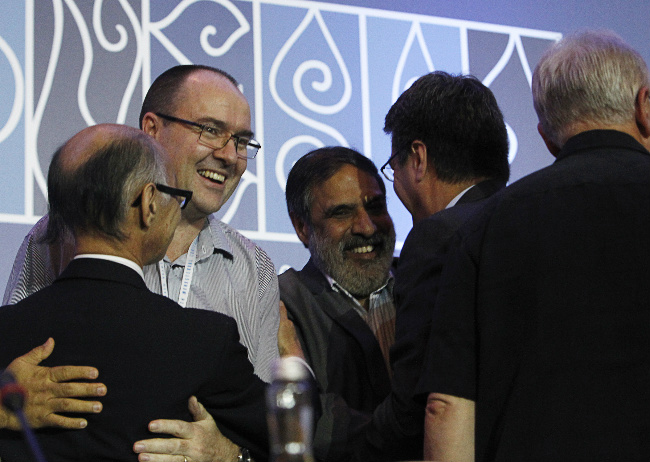
New Delhi, Aug 1: The World Trade Organization failed on Thursday to reach a deal to standardise customs rules, which would have been the first global trade reform in two decades but was blocked by India's demands for concessions on agricultural stockpiling.
"We have not been able to find a solution that would allow us to bridge that gap," WTO Director-General Roberto Azevedo told trade diplomats in Geneva just two hours before the final deadline for a deal.
"Of course it is true that everything remains in play until midnight, but at present there is no workable solution on the table, and I have no indication that one will be forthcoming."
The deadline passed without a breakthrough. WTO ministers had already agreed the global reform of customs procedures known as "trade facilitation" last December, but it needed to be put into the WTO rule book by July 31.
Most diplomats saw that as rubber-stamping a unique success in the WTO's 19 year history, which according to some estimates would add $1 trillion and 21 million jobs to the world economy, so they were shocked when India unveiled its veto.
Trade experts say Thursday's failure is likely to end the era of trying to cobble together global trade agreements and to accelerate efforts by smaller groups of like-minded nations to liberalise trade among themselves. India has been vocal in opposing such moves, making its veto even more surprising.
"Today’s developments suggest that there is little hope for truly global trade talks to take place," said Jake Colvin at the National Foreign Trade Council, a leading U.S. business group.
"The vast majority of countries who understand the importance of modernizing trade rules and keeping their promises will have to pick up the pieces and figure out how to move forward."
Some nations have already discussed a plan to exclude India from the agreement and push ahead regardless, and the International Chamber of Commerce urged officials to "make it happen."
“Our message is clear. Get back to the table, save this deal and get the multilateral trade agenda back on the road to completion sooner rather than later,” ICC Secretary General John Danilovich said.
U.S. Secretary of State John Kerry, on a visit to New Delhi, had earlier said he was hopeful that differences between India and much of the rest of the world could be resolved.
But after Azevedo's speech, U.S. Ambassador to the WTO Michael Punke was downbeat.
"We're obviously sad and disappointed that a very small handful of countries were unwilling to keep their commitments from the December conference in Bali, and we agree with the Director-General that that action has put this institution on very uncertain new ground," Punke told reporters.
India had insisted that, in exchange for signing the trade facilitation agreement, it must see more progress on a parallel pact giving it more freedom to subsidise and stockpile food grains than is allowed by WTO rules. It got support from Cuba, Venezuela and Bolivia.
India's new nationalist government has insisted that a permanent agreement on its subsidised food stockpiling must be in place at the same time as the trade facilitation deal, well ahead of a 2017 target set last December in Bali.
Kerry, whose visit to India was aimed at revitalising bilateral ties but was overshadowed by the standoff, said the United States understood India's position that it needs to provide food security for its poor but India would lose out if it refused to maintained its veto.
DEAL WITHOUT INDIA?
Diplomats say India could technically attract a trade dispute if it caused the deal to collapse, although nobody wanted to threaten legal action at this stage. The summer break will give diplomats time to mull options, including moving ahead without India.
Technical details would still have to be ironed out, but there was a "credible core group" that would be ready to start talking about a such a deal in September, a source involved in the discussions said.
"What began as a murmur has become a much more active discussion in Geneva and I think that there are a lot of members in town right now that have reached the reluctant conclusion that that may be the only way to go," he said.
An Australian trade official with knowledge of the talks said a group of countries including the United States, European Union, Australia, Japan, Canada and Norway began discussing the possibility in Geneva on Wednesday afternoon.
New Delhi cannot be deliberately excluded, since that would mean other countries slowing down containers destined for India, but if it becomes a "free-rider" it will add another nail in the coffin of attempts to hammer out global trade reform.
Trade diplomats had previously said they were reluctant to consider the idea of the all-but-India option, but momentum behind the trade facilitation pace means it may be hard to stop.
Many countries, including China and Brazil, have already notified the WTO of steps they plan to take to implement the customs accord immediately.
Other nations have begun bringing the rules into domestic law, and the WTO has set up a funding mechanism to assist. But WTO head Azevedo said he feared that while major economies had options open to them, the poorest would be left behind.
"If the system fails to function properly then the smallest nations will be the biggest losers," he said. "It would be a tragic outcome for those economies — and therefore a tragic outcome for us all."








Comments
Add new comment